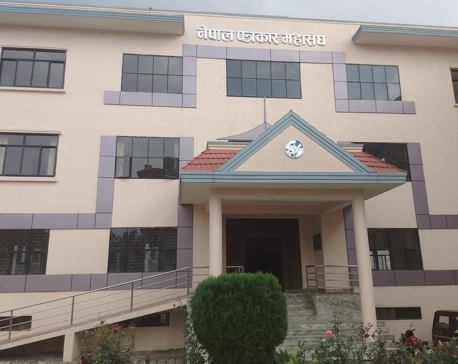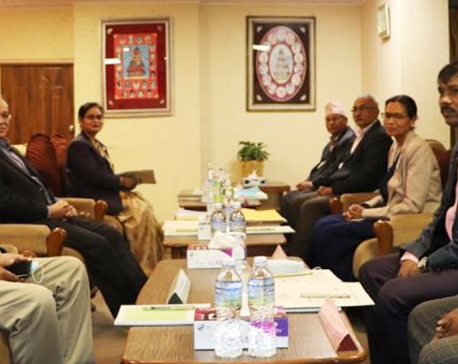
OR
Opinion

More from Author
- Rescued from Morang’s Urlabari, snow leopard now sheltered in air-conditioned enclosure at Lalitpur's Central Zoo
- NC general secretaries face criticism due to their dual character
- State Control over Media in Nepal
- Is the ruling alliance pulling an ‘election stunt’ in Nijgadh?
- Govt itself doesn’t want to build Nijgadh Airport
The government is always looking for opportunities to control the media. The stakeholders concerned have to organize protests from time to time to stop the government from doing so. Why does such a situation come up time and again?
It is normal for the state in Nepal to become intolerant toward the media and journalists. The media houses and the journalists working there are the first ones to be targeted by the undeclared attack no matter what system of governance the country has adopted and no matter which party is in the government. In such a situation, it’s only natural if the content published or telecast by the media are targeted.
The government and the parties seem to be guided by the dirty and undeclared mentality of controlling the freedom of expression to keep their hold on power. They have been using short-term and long-term strategies to attack the free press and freedom of expression. They use short-term tricks to control the media on a regular basis while long-term attacks are made through policies and laws. The latest examples of long-term attacks on the media and freedom of expression are – the Bill Related to the Amendment and Integration of Laws Related to Nepal Media Council 2075 BS, which will replace the existing Press Council Act 1992, and the National Transmission (11th Amendment) Regulations 2078 BS. Both these documents have courted controversy.
The latest example of short-term infringement on free press and freedom of expression is the 24-hour clarification sought from Nagarik daily Editor-in-Chief Guna Raj Luitel by Press Council Nepal over a cartoon titled ‘Call KP Ba’ published by the newspaper about two weeks ago. The Federation of Nepali Journalists (FNJ), Cartoonists’ Club of Nepal, Freedom Forum Nepal, and Nagarik daily have objected to the decision made by Press council Nepal. Concluding that the clarification was sought with the intention of attacking press freedom and freedom of expression, they have also warned the Council of disobedience if it does not withdraw its decision immediately.
The Acts, Rules, Policies, Guidelines etc introduced by the provincial governments for the media sector are equally non-tolerant. They have provisions to control the media and the content they transmit. Some provisions have been removed after protest by the stakeholders.
Incidents of attacking freedom of expression have repeatedly taken place in Nepal. During the political transition and upheavals, governments of all kinds view the mass media as an obstacle. The rulers in Nepal suffer from the mentality to control the mass media. Whether during the rule of the Shah dynasty or the multi-party democracy or the republican system of governance, all political parties are responsible for controlling the media or turning it to their favor.
The government is always looking for opportunities to control the media. The stakeholders concerned have to organize protests from time to time to stop this. Why does such a situation come up time and again? It’s no secret that the ulterior motive of the government is to have a control over the content published and transmitted by the mass media through the Press Council Nepal. The Media Council Bill is just an example of this. The government stepped back only after pressure from within and outside parliament.
Press Council Nepal has so far worked as the government agency to control the media and its content. It is clear that the government, through the Council, wants to control the media and journalists. The Ministry of Communications and Information Technology is the government’s line ministry to deal with the media. This ministry, through the Council, or directly plays the role to manage, regulate, monitor and control this sector.
Media-affiliated organizations like the Federation of Nepali Journalists, Press Chautari, Press Union, Press Center, Federation of Nepalese Indigenous Nationalities Journalists, Sancharika Samuha etc vehemently protested against the latest Bill. They accused the Council of trying to control the media in the name of adherence to the code of conduct.
The Bill says that the chairman of the Council will be recommended by a committee led by the secretary of the Ministry of Communications and Information Technology. The stakeholders are protesting against this provision, arguing that it is against the government’s principle to make the Council fully autonomous and free. In the Bill initially presented in parliament, the provisions related to the observance of the code of conduct for journalists, monitoring and action were still scarier. Provisions like imposing a fine ranging from Rs 25,000 to Rs 1 million on mass media, their publishers, editors, journalists or reporters for the breach of the code of conduct.
Following widespread protests from the stakeholders, the Bill was amended and these provisions were removed. This shows that the government is always trying to scare the media and control it. All governments of the past maintained such draconian views against the media. Therefore, all stakeholders should work as the real watchdog of the sector.
Even in the amended Bill, the process to appoint the Chair of the Council has not been amended. Provisions like scrapping the press pass of journalists and canceling the registration of the media houses are still intact. The stakeholders are protesting against such provisions. They have been demanding that the Press Council be made an autonomous body and the media be made self-responsible in implementing the code of conduct.
Senior Vice-president of FNJ, Ramesh Bista says, “We are against the provision for appointing the Council Chair and some provisions of the code of conduct, though the provision related to fine has been amended. We are confident that the new parliament to be elected won’t give continuity to the provisions introduced with the aim of not allowing the Press Council to be autonomous.”
Bista is of the opinion that although the parliament to be elected can use the amended Bill as a resource document, it should not give continuity to the controversial and objectionable provisions in the Bill. “The Federation of Nepali Journalists hasn’t changed its stance on the Bill. We are ready to launch fresh protests if efforts are made to give continuity to the controversial provisions,” says Bista.
According to Bista, the Bill which was prepared when UML Chairman KP Oli was the prime minister is intolerant to the media sector. “Several provisions of the Bill were amended. But that’s not enough. There are still several controversial and objectionable provisions in the Bill,” says Bista.
This Bill was prepared during the rule of the previous government which inserted the provision of a maximum fine of Rs 200,000 by the Council in case of a breach of the code of conduct by journalists or media houses. The current coalition government raised the amount of fine to Rs 1 million. Nevertheless, this provision has now been removed from the Bill.
Meanwhile, a set of regulations related to the media sector introduced by the government has also courted controversy. The FNJ has objected to the National Transmission (11th Amendment) Regulations 2078 BS which was published in the national gazette by the government, arguing that some provisions of the regulations discourage the people from expressing their opinions through the Internet.
In the Regulations, online television has been defined as “a task of producing audio-visual programs and regularly transmitting them through the Internet.” The FNJ has protested against the Regulations, saying this unclear definition of online television poses a risk of discouraging and controlling those who want to express their opinions through Internet platforms.
The FNJ has said, “The State should play a role to facilitate the citizens to make proper use of Internet platforms and to acquire knowledge and information through the Internet.”
Another provision in the proposed amendment requires the media to take permission from the authorities to telecast content produced abroad. “The government doesn’t seem to have paid proper attention to holding discussions with the stakeholders while amending laws and make them acceptable to all. We draw the attention of the government toward this flaw,” the FNJ has said.
The stakeholders agree that the media outlets and the content they publish or telecast should be regulated. However, the kind of regulation needed is yet to be decided upon. So far, Press Council Nepal has been regulating the media outlets in the country and the content they publish or transmit. The regulation of the media sector in the country is carried out on the basis of the Journalists’ Code of Conduct jointly prepared by the Press Council, FNJ and other stakeholders.
Ram Prasad Dahal, a member of Press Council Nepal and a former secretary of FNJ, says, “The organizations which are registered after completing certain legal procedures need to be regulated. However, regulating them does not mean controlling them. It means cautioning them toward their duties and responsibilities and making them responsible and strengthening them.” He says that the Press Council will play the role of a facilitator in this regard.
Dahal says that the media outlets in the country and the content they publish or transmit can be regulated as per the existing rules and regulations. “Press Council Nepal has implemented the code of conduct by remaining within the constitutional boundaries. It has to play the role of a facilitator so as to encourage the media persons/ outlets for self-regulation,” he says. He adds that as new media platforms like YouTube are emerging, the Council has to move forward in a new way so as to manage the new media as well.
The government has defined radio, television, satellite and the Internet as the transmission media. Also, the government has formulated over six acts, six regulations and policies related to the mass media, right to information, working journalists’ rights and transmission. Similarly, there is a huge pile of dozens of reports prepared by the commissions, committees and task forces formed after each political change and upheavals. But the government never showed any interest in implementing these reports.
President of the Association of Community Radio Broadcasters (ACORAB) Nepal, Arjun Giri says, “The provincial governments, too, are following in the footsteps of the federal government which is really very sad for this sector.” According to him, the acts, rules, policies and guidelines formulated by the provincial governments about the mass media and their content are equally illiberal.
“They have taken their cue from the central government. They have introduced legal provisions that allow them to scrap the license of media houses and control and interfere in the content of the mass media,” says Giri, “The intention of the provincial governments, too, does not look good. They, too, are going in the opposite direction.”
According to Giri, while drafting provincial media laws and policies for the first time, the provincial governments introduced provisions to attack the people’s right to expression against the constitution. Through those provisions, the provincial governments tried to control the mass media, their publishers and journalists. Some of these provisions were removed while others were amended after strong protests by the FNJ, ACORAB and other stakeholders. Giri says that the provincial governments of Bagmati, Lumbini, Gandaki and Karnali provinces were especially illiberal in this regard.
“We still need to be watchful and vigilant. There are still several provisions which need to be amended,” says Giri.
You May Like This

IFJ, FNJ ask govt to drop harsh provisions in proposed media law
KATHMANDU, May 12: The International Federation of Journalists (IFJ), the global media watchdog, and the Federation of Nepali Journalists (FNJ)... Read More...

Second round of talks between govt and agitating Tharu group ends on positive note
KATHMANDU, April 4: The second round of talks between the government and Tharu agitators has ended on positive note. ... Read More...

Nepal Republic Media wins WWF Conservation Award
KATHMANDU, Sept 23: Nepal Republic Media (NRM) was awarded the Conservation Media Award WWF (World Wildlife Fund) for 2016. In... Read More...





Just In
- Health ministry to conduct ‘search and vaccinate’ campaign on May 13
- Indian customs releases trucks carrying Nepali tea, halted across Kakarbhitta
- Silent period for by-election to begin from midnight
- SC issues short-term interim order to govt and TU not to take immediate action against TU legal advisor Khanal
- National consultation workshop advocates to scale up nutrition smart community in Nepal
- Patan High Court issues short-term interim order to halt selection process of NTB’s CEO
- NEPSE inches up 0.15 points; daily turnover increases to Rs 2.53 billion
- Bagmati Govt mandates tri-lingual signboards in offices














Leave A Comment